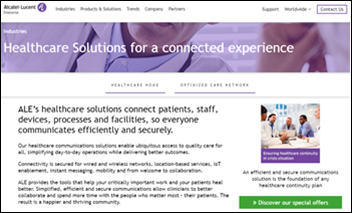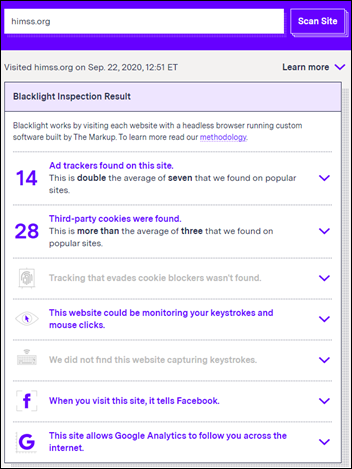HIStalk Interviews Blake Marggraff, CEO, CareSignal
Blake Margraff is CEO of CareSignal of St. Louis, MO.

Tell me about yourself and the company.
I co-founded the company CareSignal, which was previously called Epharmix, and I serve as CEO. CareSignal is a simple enough concept. We create device-less remote patient monitoring solutions to help support risk-bearing providers, payers, and the patients or members they serve, with a primary focus on chronic condition long-term management and support.
What led you five years ago — as a 22-year-old coming out of pre-med — to form a company in an industry that is notoriously hard for newcomers to crack?
There’s a pragmatic answer and a philosophical answer. The pragmatic answer is that I saw an opportunity to do one of my favorite things, which is to orthogonally combine technology – which, to your point, a lot of people have thought would work by itself and hasn’t — with evidence. The basis of our company is evidence first, sales second.
Philosophically, though, if I could spend my time doing anything, I want to be able to look back in one month, one year, 10 years, 50 years, and be proud of the impact it had and the scale of that impact. I think healthcare, and specifically health technology, is the best one-two punch out there.
Some wellness technology companies offer solutions that, if they work at all, won’t deliver ROI for years, when the cost savings of improving chronic conditions will finally pay off for some other employer or insurer. How do you approach a prospect who questions return on investment?
These are two really important concepts. The credibility of the argument, fundamentally, always involves return on investment. That credibility comes in the form of defensible impact clinically and then financially, but also the time horizon of that impact. Getting a person to stop smoking is a good thing, but financially it might not actually be a good thing for one, five, or 10 years.
To the people who have abused the concept of evidence-based or clinically validated outcomes — and you can bleep this in the written version — but frankly, f*** them. They are treading on one of the most elegant and powerful parts of medicine, which is the concept that you can advance the standard of care by thoughtfully conducting high-impact research and iterating on innovation in the process.
In terms of CareSignal, we announced recently that we now take risk on any contract we sign. We are confident that we can engage through all the patients, drive clinical outcomes, and return financial benefit to our partners with the time horizon of less than a year, and generally within six months. That touches on all the points that you mentioned. It’s not enough just to do it — you have to do it in a way that is financially compelling to your partner.
What portion of patients show a willingness to interact honestly with automated messages about a concerning condition, but would not have taken the initiative to reach out directly to their provider?
You are hitting on selection bias, and maybe touching on the transtheoretical model of behavior change as well. It is true that some healthcare innovations can only help people who want to be helped. That’s always true to an extent, but I fundamentally reject that as a barrier to bending the cost curve, or even engaging the vast majority of patients who need to be engaged and supported.
The argument that I provide is a simple one. When providers, meaning physicians primarily, want to effect change, they leverage this power of the prescription. There is still an element of healthcare that is relationship driven, stemming from the strong relationships that many providers still have with their patient populations. The best technology sits at that intersection of clinical and relationship.
Does the political concept of campaigning only to the undecideds make sense in population health management in focusing resources on patients who are most likely to benefit from health messaging?
I don’t have deep background, so I’m almost wary of speaking to that and I would just be pontificating on it. I will say that looking at chronic conditions, there’s kind of an ironic behavior trend that we see across our patient population and partners. Patients who are doing just fine wind up disengaging faster than patients who are experiencing adverse outcomes or adverse symptomatology. The heart failure patient who hasn’t had pedal edema or nocturnal dyspnea for months, maybe even years, is going to be much less inclined to stay engaged and to provide clinically helpful, actionable patient-reported outcomes. Whereas the one who’s struggling is going to do so more.
A well-designed system will support people who are doing just fine for the long term, but will then allow the benefit to be had by the people who decompensate or get worse, whenever that happens, and that could happen a month or a year down the road.
Does the interaction between care managers and patients in your system populate other systems, such as EHRs?
Absolutely. CareSignal can operate as a standalone system. That’s important because a lot of groups need to operationalize and prove any new partnership or investment. We integrate with Redox and have a whole lot of respect for Niko, Luke, and the team. They can integrate with any EHRs that they touch.
Providers might react to a patient’s response to automated messages by either assuming that they are fine or that they need to come in for an office visit. What other kinds of communication do you see?
Our system is white-labeled, so from the perspective of our partners and patients, it is always their system. It’s essentially a warm line that is always ready. For patients who are in that rising risk bucket with barely-controlled chronic conditions that could go south at any moment, having a direct line to the care management team that you already know is powerful.
How is your system being used differently in the pandemic?
It’s just being used more. I’m grateful for the new opportunity from a business perspective, but the whole team and I have been pretty humbled to see that it’s doing what we always thought it could do in virtual health. Telehealth is table stakes and is increasingly quite present and quite high quality, but providers especially are emphasizing the need to defend relationships and grow revenue, and sometimes the reverse depending on their financial position. It’s the long-term engagement, ideally long-term, clinically actionable engagement, that seems to speak to them as we all go through this frustrating process.
What advice would you offer to people like you who didn’t come up through the health IT ranks or who may be disappointed by its bureaucracy and long purchasing cycles?
There’s a great mental model of Chesterton’s Fence. A couple of guys come across a fence in a field. One says, “Let’s tear this down. This is stupid. This is pointless.” The other guy says, “That’s fine. You can do that, but at least first tell me why it was built.”
That’s how I approach a lot of the conversations. It can seem like there’s too little of one type of thing and there is too much of another thing that seems unnecessary. You have to understand why it was put there in the first place if you’re going to effect sustainable change that will benefit all of the stakeholders. I guess that has brought me to the conclusion that everybody in this space deserves a huge amount of respect, if only for their patience and often their iterative investment in a pretty weird industry over the past decades.
What is good and bad about how investors may take a company in a different direction that it originally planned?
Founders have to remember that investment is a means to an end. Folks who want to raise money so that they can raise money … most investors will not invest in that type of founder or business. More positively, I can cite investors such HealthX, UnityPoint, OSF, and others that are deep in healthcare, as well as many more that are immediately adjacent to health IT. They are run by operators and industry incumbents. It’s too complex of an industry for me to think that I can come in and figure everything out. The best investors not only provide good direction, but help you learn faster.
You started your entrepreneurial journey at a young age. What do you hope to accomplish?
Impact. Help as many people as possible live better lives and live longer lives. It comes back to the beginning. That’s what keeps me so motivated, even in a sometimes slow-moving industry, to keep pushing.























































While unsanctioned AI tools are likely causing great consternation for CIOs/CISOs, the industry has a long track record of clinical…